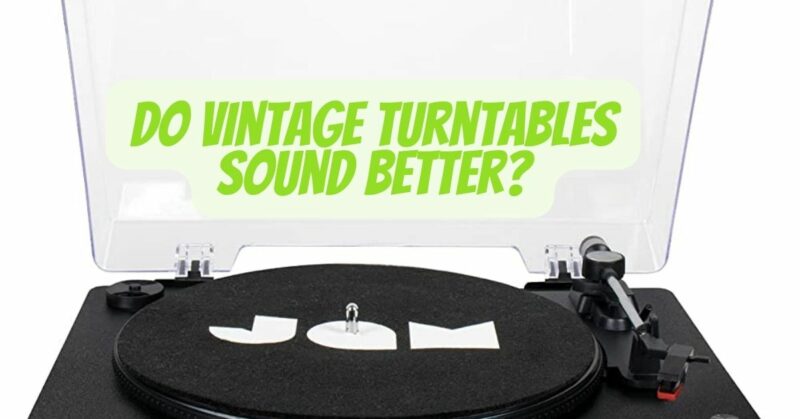Vintage turntables have a certain allure that draws audiophiles and music enthusiasts alike. They often come with nostalgia, classic aesthetics, and a reputation for delivering warm, analog sound. However, when it comes to sound quality, the debate over whether vintage turntables actually sound better than modern counterparts is a complex and subjective one. In this article, we’ll explore the factors that contribute to the vintage turntable mystique and examine whether they genuinely offer superior sound quality.
The Appeal of Vintage Turntables:
1. Aesthetics: Vintage turntables often feature classic, timeless designs that evoke a sense of nostalgia. Many audiophiles appreciate the visual charm of vintage gear.
2. Build Quality: Older turntables were often built with high-quality materials and craftsmanship. They tend to be robust and durable, contributing to their long life spans.
3. Analog Warmth: Vintage turntables are associated with analog audio, which some listeners prefer for its warm, natural sound characteristics.
Factors to Consider:
While vintage turntables possess undeniable charm, several factors must be considered when evaluating their sound quality in comparison to modern models:
1. Maintenance and Wear: Vintage turntables may require significant maintenance and restoration to bring them back to their original performance levels. Components like belts, cartridges, and bearings can wear out over time and need replacement.
2. Technology Advancements: Modern turntables benefit from decades of technological advancements. Developments in materials, precision engineering, and manufacturing techniques have led to improved performance and lower signal distortion.
3. Variable Quality: Not all vintage turntables are created equal. The market is flooded with a wide range of models from different eras, some of which were budget options and may not offer exceptional sound quality.
4. Compatibility: Vintage turntables may lack modern features like USB connectivity or compatibility with contemporary audio systems. Adapters and additional components may be needed to integrate them with modern setups.
The Subjective Nature of Sound Quality:
One of the most significant challenges in comparing vintage and modern turntables is that sound quality is highly subjective. What sounds better to one listener may not be the same for another. Factors such as personal taste, hearing acuity, and the quality of associated components (e.g., speakers, amplifiers) all influence the perceived sound quality.
Moreover, the concept of “better” sound is multifaceted. Some people prefer the warmth and character of analog sound, while others prefer the clarity and accuracy of digital audio. Sound quality preferences can vary greatly among individuals.
Modern Turntables’ Advantages:
Modern turntables have several advantages that may appeal to audiophiles:
1. Consistency: Modern manufacturing processes ensure consistency and precision in components, leading to more predictable performance.
2. Technological Innovations: Features like adjustable tonearms, improved anti-vibration measures, and advanced cartridges can enhance audio quality.
3. Convenience: Many modern turntables come with features like USB connectivity for digitizing vinyl records or built-in phono preamps for easy integration with modern audio systems.
Conclusion:
The question of whether vintage turntables sound better than their modern counterparts is ultimately subjective. Vintage turntables offer a unique charm and may provide a specific analog character that some listeners adore. However, they often require more maintenance and may not have the same level of performance consistency and convenience as modern turntables.
Choosing between vintage and modern turntables should be based on individual preferences, budget, and the desire for a particular aesthetic or listening experience. Both vintage and modern turntables have their merits, and the best choice depends on what resonates with your personal tastes and priorities as an audiophile or vinyl enthusiast.


